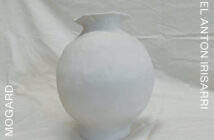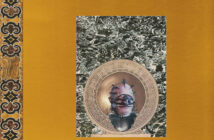
Peasgood Nonsuch is a gentle, caressing work from one half of Isan, Robin Saville. It contains one of the underlying characteristics of most good music – a fine tension between simplicity and complexity. Built on plaintive, repetitive guitar figures, the music ebbs and flows through the building and receding of subtle synth figures to create ever shifting dynamics. Intentionally naive rhythm programming serves as an unobtrusive pulse rather than an attention seeking cerebral concern. In fact, one of the key features is the ability of all the elements to flow along organically, without trying to engender a ‘gee-wiz’ kind of reaction which often accompanies the production of electronic based music. Which is not to say the work is lazily produced – far from it – but the production serves the mood, and serves it to great effect.
Guitars both acoustic and electric cycle through each track. ‘Magpie’ opens the album setting out the template for what is to come. It features a descending, circular acoustic guitar motif over which airy synths cascade. In ‘Colin the Lazy Cormorant (Pt 2)’ the guitar figure sounds as though it is doubled on marimba, but the subtlety makes it unclear if this is actually the case or not, an example of the manner in which sound serves the music, rather than the other way around. ‘Exultation’ kicks off with an African thumb-piano before subdued flute meshes with wistful melodies. That description sounds exotic, but there’s not a hint of tackiness or fetishism for its own sake in the music. ‘Cloud Pathology’ ends the album with some reversed guitar bursts punctuating mesmeric synth and wordless vocal melodies.
While Peasgood Nonsuch has obviously been created with the peaceful end of mood music in mind, it is far from new-age noodling and provides for an engaging listen.
Adrian Elmer



